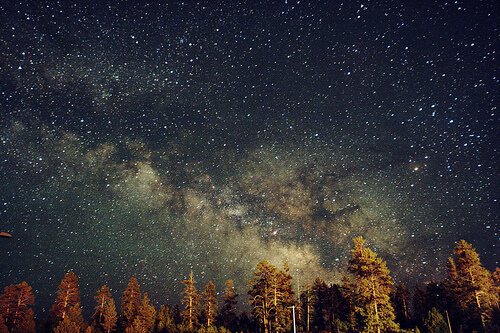
Isaiah 40:25-26
It was a moment of metaphysical dizziness. It happened as I stood awestruck, speechless, on the shore of Lake Bemidji in northern Minnesota. For the first time in months I was able to see the Milky Way arching magnificently from one end of the sky to the other. It is our own backyard neighborhood galaxy of some 400 billion stars. There are billions more galaxies like it!
I wanted to say something that night as I looked at the Milky Way, but didn’t know what to say. I couldn’t find the words to pray to the Keeper of the Stars. I could only be silent, but I think that was prayer. I thought of the book I had been reading on the plane to Minnesota. It is by physicist Gerald Schroeder of the Weismann Institute in Israel. One particular section of his book stood out to me as I pondered the Milky Way:
“The same laws that govern the ten thousand billion billion stars among the hundred billion galaxies of our universe stretching over some 15 billion light years of space also govern chemical reactions within the 0.001 centimeter of a cell” (The Hidden Face of God: Science Reveals the Ultimate Truth, p. 35)
I wondered at the thought of ten thousand billion billion more stars like the ones I saw sparkling that night! It must have been a similar sense of metaphysical dizziness for the prophet Isaiah, as on a Judean night he heard the voice of God questioning: “’To whom then will you compare me, or who is my equal? Says the Holy One. ‘Lift you eyes on high and see.’”
“To whom then will you compare me?” It is natural that we mortals want to compare God to someone or something. It helps us to think about Him and talk about Him. But saints and poets through the centuries have all been haunted by the awareness that there is literally no one, or no thing, to which we can compare God. He is after all, incomparable!
Yes, we say that God is like a shepherd, like a father, or like a fortress. But each time we say that we have to retract our words because God is beyond any comparison. Each time we rightly affirm that “God is love”, we must also admit that God loves in ways beyond our comprehension. Elsewhere Isaiah cautions us in what we might think about God or say about Him: “For as the heavens are higher than the earth, so are God’s ways higher than your ways and God’s thoughts than your thoughts” (Isaiah 55:9).
Many regard St. Augustine as the greatest of all theologians, but even the great Augustine knew just enough to know that he didn’t know. Augustine wrote: “We are talking about God. What wonder is it that you do not understand? If you do understand, then it is not God.”
St. Thomas Aquinas, the learned “Doctor of the Church” also wrote of the limits of our understanding of God and His ways: “And this is the highest knowledge of God in this life, that we know Him to be above every thought that we are able to think of Him.”
Tonight it is cloudy and I will not be able to see the Milky Way. But from that moment of metaphysical dizziness I hold three thoughts, human and finite though they are:
- God is bigger than any thoughts we have of Him, any theologies, systems, or doctrines we have ever learned or taught.
- God answers prayers “abundantly far more than all we can ask or imagine” (Ephesians 3:22).
- And, together with all believers, we must keep striving “to know the love of Christ that surpasses knowledge” (Ephesians 3:19).
O the depth of the riches and wisdom and knowledge of God! How unsearchable are his judgements and how inscrutable his ways!
Romans 11:33
Grace and peace,
Tim
photo by madmiked


